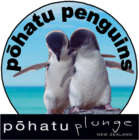What we do
Supporting research
Monitoring
By monitoring nests, we are collecting observations about the penguins but also any other clues such as poo, parasites, predation marks, etc. It gives us information to understand better what is happening in the colony, so that we can adapt the conservation work we do. For example, if we notice signs of competition for nesting sites (injuries on the face) we can then build and place more nest boxes in competitive areas. Or step up our trapping in certain areas if we see signs of predation.

Monitoring can temporarily bring stress to the penguins so the guides are trained in “what to look for” in a short amount of time to lessen the disturbance to the bird(s). Little Penguins are incredibly tenacious when it comes to where they want to live. Monitoring is a small inconvenience for a great benefit for the entire colony. Through the helpful data we get out we learn how to better protect them and we can also see trends over time. A breeding biology study was undertaken in the Pōhatu bay colony in 1996-2009. It was undertaken monitoring 30 nesting boxes and became a published paper.
Since this study was done, penguins in our colony haven’t been banded (Flipper-bands) *. Microchipping is best practise in New Zealand now but is more expensive. The nest boxes are all numbered so this can give us a good overview on the breeding success of the Pōhatu colony but we can’t track an individual penguin without micro-chipping.
*One old penguin still had her band and she kept coming back in the same nest box for 21 years. This gives us a very interesting info on how old penguins in the wild can live up to. Our data is shared in a national study of Little penguins in a partnership with New Zealand Penguin Initiative.
Partnership with others
It’s important for us to stay up-to-date in the latest penguin conservation techniques and best practises. Our team frequently goes to workshops and seminars meeting with other people who work in the field. This has kept our enthusiasm alive for protecting our little penguin friends, knowing we are not alone.
Marine science students.
We have had the opportunity to work with some very passionate people, volunteering in the field research for the Hoiho/Yellow-eyed penguin, watching and learning how to handle, weigh, microchip and collect data using loggers and satellite GPS location devices. This has been vital information for research scientists to help protect these birds, which are on the brink of extinction. This information has gained insight into how these birds live at sea which is going to be a major factor in putting in more marine protection.
Department of Conservation.
Of course, we work closely with the Department of Conservation. We are a “DoC approved operator” and a “DoC SMART operator” and hold a special license under the Wildlife authority act to rehabilitate birds. We also take part in a conservation-based pilot program run by DoC, and work together for the penguin surveys. Over the years we have developed good communications with our local rangers and partnership in the protection of the marine reserve, using a direct line to local rangers to inform them of any poaching activities in the marine reserve with illegal fishing or disturbance to wildlife.
We are also lucky to work with various local community groups and trusts. The Banks Peninsula Conservation Trust, the Akaroa Marine Protection Society, Friends of Banks Peninsula and Regenerate Banks Peninsula.
Banks Peninsula Conservation Trust As we like to say “Team work makes the dream work”!! Regenerate Banks Peninsula
|
An introductory video about the importance that marine birds play in our marine environment, and the importance of research allowing us to understand their behaviours and marine habitat use to better protect them.
|
To celebrate the 10th anniversary of the Akaroa Marine Reserve and the 25th anniversary of the Pōhatu Marine Reserve, key stakeholders gathered on the 10th of March during Sea-week 2024 to commemorate these achievements for New Zealand marine wildlife. |
Hear from Dr Rachel Hickcox about the importance of monitoring a penguin colony. |
|
Discover the ins and outs of our Adopt a penguin program
|

